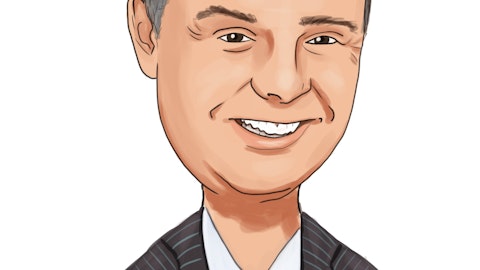Gary Tenner: Okay. So can you talk at all about how you kind of laddered those out in terms of maturities. So we’ve got a…
Malcolm Holland: We are – from an interest rate risk, I would like to keep them under 12 months. From a – just thinking about the overall balance sheet and how we balance out liquidity, we’re going out 18 to 24 with some. So I’d say it’s skewed to 12 months and under, but there is some that we’re doing that’s a little bit longer. I don’t want to go real long because – and customers are way more frequently asking for longer term CDs, and that’s just not where we’re pricing aggressively or as aggressively. We’re trying to keep everything 12, 15, 18 months and end.
Gary Tenner: Okay. Thank you.
Malcolm Holland: Thanks, Gary.
Operator: Thank you. Our next question comes from Brett Rabatin with Hovde Group. You may proceed.
Brett Rabatin: Hey, guys. Good morning.
Malcolm Holland: Morning, Brett.
Terry Earley: Hey, Brett.
Brett Rabatin: I wanted to circle back on credit and just a few pieces to it and just make sure I understood the – I know you guys make downgrades pretty quick and you’re aggressive with that. But just the three office properties, can you maybe talk about that and what you’ve done taking a look at your commercial real estate portfolio and maybe what led to those downgrades?
Malcolm Holland: Yeah. So that’s a great question, Brett. Thanks for the question. We did a deep office dive during the quarter that we looked at every loan over $1 million in the book. And just to make sure that we appropriately had everything graded and we’re addressing anything that we saw that had any weakness in the deal. So we looked at every credit over $1 million in that portfolio. And that’s just part of our surveillance process for the entire year.
Brett Rabatin: So any color on what specifically led to the downgrade of those three credits?
Malcolm Holland: Loss of tenants. And then one has just been a historical problem asset that came out of the PCD acquisition of Green Bank that has been – had some damage to it from Hurricane Harvey that has never really recovered from that. So…
Brett Rabatin: Okay. So it sounds like it’s – instead of in LTV, it’s basically a cash flow perspective and…
Malcolm Holland: Yes…
Brett Rabatin: And in issues with. Do you guys have any color on how much Class B office space you might have kind of inside the loop?
Malcolm Holland: Inside of which loop?
Brett Rabatin: Houston specifically?
Malcolm Holland: None that I’m aware of, we have no CBD office exposure. Class B in general, that makes up 33% of our office book today, 62% of our office book is in Class A, which is encouraging to me because that’s where I will – I think we’ll see the least amount of stress.
Brett Rabatin: Okay. And were these – and sorry for some of the questions on this, but were these three credits, the bulk or all of the increase in criticized assets linked quarter?
Malcolm Holland: No, that’s not all of them. The largest one that I discussed within our note finance group, a move to a special mention of one of those borrowers. That’s actually the largest office was second and then, yeah. So those are the two largest areas of downgrade during the quarter.
Brett Rabatin: Okay. And then back on deposits for a second. Obviously, you funded the balance sheet in the fourth quarter with CDs. And last year, there were some various efforts to find alternative sources to grow funding that would maybe be market-oriented, but maybe not be CDs. Given the environment and Terry, you guys sound a little shell-shocked with just the competition from the treasury market. Has your view changed or could you maybe pivot to a different strategy in terms of looking for alternative sources to grow deposits, whether it be fintech or other sources that might not entail CD funding?



